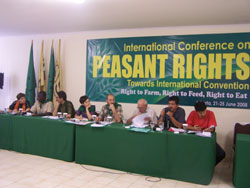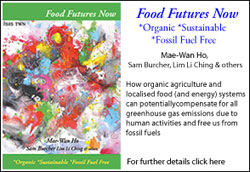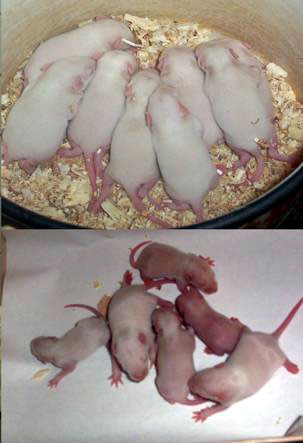July 2008
http://www.grain.org/nfg/?id=583
http://www.grain.org/seedling/?type=73
IN THIS ISSUE
One of the few benefits of the current food crisis is that it is focusing attention on the way food reaches some of the most disadvantaged people in the world. As we show in our editorial, much of the blame for the remarkable increase in food prices over the last year can be attributed to speculators fleeing the collapse in the US mortgage market. By February and March this year big funds were investing about US$1 billion a day in commodities markets. Just to be clear, these funds were not buying or selling physical commodities but betting on future price movements in these markets.
All this activity has driven up prices, causing a "disconnect" or a "divorce" between the value of a futures contract and the actual supply of the real commodity. Although world stocks of some commodities, such as wheat, are low, the supplies of other commodities, such as cotton, are at an all-time high. Yet the price of almost all traded commodities has surged. It is a bubble that is bound to burst, but meanwhile it is leading to a 40 per cent increase in the food bills that developing countries face this year. For the poor in countries such as Haiti, Eritrea and Burundi, which are heavily dependent on food imports, this is having a catastrophic impact. But for multinational food traders, such as Cargill and Archer Daniel Midland, it is a chance to clock up extraordinary profits. It is a graphic illustration of the huge -- and increasing -- disparity of wealth in the modern world.
Such moments of crisis offer a chance for change. It is for this reason that a fierce battle is currently being fought. On the one hand, multinational biotechnology corporations, with the support of the US government, are taking advantage of the crisis to launch a huge offensive to promote hybrids and genetically modified organisms (GMOs). Providing no evidence to support their case, they claim that only farming carried out with their sophisticated products can provide the food needed to feed the world. As our article on hybrid rice demonstrates, the corporations are even using the crisis to relaunch products that are widely seen not to have lived up to the expectations created around them when they were first put on the market. On the other hand, organisations of small-scale farmers, fisherfolk and indigenous people are saying that the current crisis has shown how dangerous it is for countries to allow multinational corporations and speculators to take control of their food supply. The way forward, they say, is sustainable food systems, based on indigenous knowledge and controlled by local farmers.
However that battle is resolved, Professor Tim Lang, a leading food specialist in the UK, believes that far-reaching change is coming to the way we produce and market food because of new environmental and energy constraints, the "new fundamentals", as he calls them. In his interview with us, he says that "it looks likely that we might be sleep-walking into a world in which blood flows, metaphorically and at times actually, due to mistakes over food policy." He wishes to avoid this outcome, if at all possible, but he has no doubt on which side he stands, if the crunch comes: "Ultimately, we have to side with food democracy over food control."
While this tussle is being fought in the full glare of the world's media, other highly significant changes are attracting much less attention. One example is the way US and EU corporations are cleverly twisting food safety regulations to promote their products in foreign markets and to protect their domestic markets. As our ground-breaking article shows, corporations are having to develop new strategies now that the advance of free market capitalism means that they can no longer use tariffs and quotas to keep out competitors.
In this issue we also have two other stories that you are unlikely to encounter elsewhere. One concerns the arrival of the highly pathogenic H5N1 variety of avian flu into the West African country of Benin. Lessons should have been learnt from earlier outbreaks in other countries but sadly they were not. The other story is an account of the way farmers in Andhra Pradesh in southern India are building an ecological and sustainable model of farming that allows them to restore the fertility of their soils and to break free of the control of the middlemen who used to sell them on credit Bt cotton seeds, chemical fertilisers and pesticides. For a country where some 150,000 farmers have committed suicide over the last decade, this initiative lights a beacon of hope.
The editor
Download the entire issue of Seedling:http://www.grain.org/seedling/?id=549http://www.grain.org/seedling/?id=549&pdf
===========================================================
GETTING OUT OF THE FOOD CRISIS, editorial by GRAIN
http://www.grain.org/seedling/?id=550http://www.grain.org/seedling/?id=550&pdf
While there has been widespread reporting of the riots that have broken out around the world as a result of the global food crisis, little attention has been paid to the way forward. The solution is a radical shift in power away from the international financial institutions and global development agencies, so that small-scale farmers, still responsible for most food consumed throughout the world, set agricultural policy. Three interrelated issues need to be tackled: land, markets and farming itself.
THE FOOD CRISIS AND THE HYBRID RICE SURGE by GRAIN
http://www.grain.org/seedling/?id=551http://www.grain.org/seedling/?id=551&pdf
Despite the fanfare about soaring yields, hybrid rice has not been a successful crop. Three decades of subsidies and research have failed to bring it into mass production, except in China. But now, with the world facing a serious rice crisis, hybrid rice is back on the agenda. It is being strongly pushed as the only way of boosting rice production. The consequences of a large-scale shift from conventional rice to corporate-friendly hybrids would be devastating not only for small farmers but also for future world rice production.
THE FOOD EMERGENCY AND FOOD MYTHS by Vandana Shiva
http://www.grain.org/seedling/?id=552http://www.grain.org/seedling/?id=552&pdf
Why Bush is wrong to blame Indians for the rise in food prices
INTERVIEW WITH TIM LANG
http://www.grain.org/seedling/?id=553http://www.grain.org/seedling/?id=553&pdf
Professor of Food Policy at City University in London, Timothy Lang is a leading authority on food. He has written extensively on issues such as food security, food inequalities, nutrition and the tension between food democracy and food control. The steep rise in the price of basic food commodities on the world market this year came as no surprise to him, for he has been warning for some time that the world is "sleepwalking into a crisis".
MISMANAGING AVIAN FLU IN BENIN by Patrice Sagbo
http://www.grain.org/seedling/?id=554http://www.grain.org/seedling/?id=554&pdf
A highly pathogenic variety of the H5N1 type of avian flu was first reported in the West African country of Benin in December 2007. Even though this type of flu has been known for more than four years, the authorities in Benin, rather than learning from others' experiences, have repeated many of their mistakes: they have dealt with the outbreaks secretively; they have blamed wild birds, with no supporting evidence; they have failed to ban the import of poultry. Worse still, they are refusing to pay compensation and thus causing huge economic problems for thousands of small farmers who have lost their livelihoods.
FOOD SAFETY - RIGGING THE GAME by GRAIN
http://www.grain.org/seedling/?id=555http://www.grain.org/seedling/?id=555&pdf
As the push toward neoliberalism advances, and quantitative measures to protect local markets, such as tariffs and quotas, disappear, industrial powers are turning to qualitative measures such as food safety regulations to further skew trade in their favour. In the food safety arena, both the US and the EU are pressing their standards on other countries. For Washington, even though its own food safety system is widely criticised as too lax, this means getting countries to accept GMOs and US meat safety inspections. For Brussels, whose food safety standards have a much better reputation, it means imposing high standards on countries that cannot meet them. Bilateral free trade agreements (FTAs) have become a tool of choice to push through the changes.
SPROUTING UP
Polish farmers defy EU bureaucracy
http://www.grain.org/seedling/?id=558
http://www.grain.org/seedling/?id=558&pdf
Saying 'no' to chemical farming in India
http://www.grain.org/seedling/?id=559
http://www.grain.org/seedling/?id=559&pdf
Seeds of information - "GM seeds dig in", "Peak glyphosate", "Crisis management" and "GM crops not the answer"
http://www.grain.org/seedling/?id=561http://www.grain.org/seedling/?id=561&pdf
Etiquetas: GRAIN





 Presented to the media on June24th, 2008 in Jakarta during the International Conference on Peasant Rights. “Right to grow, right to feed, right to eat”
Presented to the media on June24th, 2008 in Jakarta during the International Conference on Peasant Rights. “Right to grow, right to feed, right to eat”



